
Mott the Hoople were an English rock band formed in Herefordshire. Originally named the Doc Thomas Group, the band changed their name after signing with Island Records in 1969. The band released albums at the beginning of the 1970s but failed to find any success. On the verge of breaking up, the band were encouraged by David Bowie to stay together. Bowie wrote their glam-style signature song "All the Young Dudes" for them, which became their first hit in 1972. Bowie subsequently produced their album of the same name, which added to their success.

Michael Geoffrey Ralphs is an English retired musician, vocalist and songwriter, who was a founding member of rock bands Mott the Hoople and Bad Company.

Luther James Grosvenor is an English rock musician, who played guitar in Spooky Tooth, briefly in Stealers Wheel and, under the pseudonym Ariel Bender, in Mott the Hoople and Widowmaker.
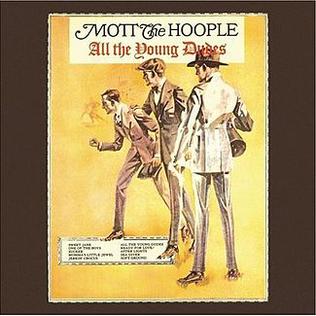
All the Young Dudes is the fifth studio album by the English rock band Mott the Hoople, released in 1972. It was their initial album for the CBS Records label, after three years with Island Records in the UK and Atlantic Records in the United States and Canada.

Mott is the sixth studio album by British rock band Mott the Hoople. It peaked at No. 7 in the UK Albums Chart. It is the last album to feature guitarist Mick Ralphs, and the first without organist Verden Allen; because of Allen's departure, most organ and other keyboard parts are played by Ralphs.
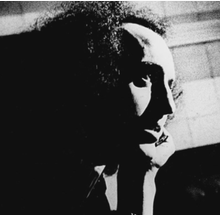
Guy Stevens was a British music industry figure whose roles included DJ, record producer and band manager. He was influential in promoting R&B music in Britain in the 1960s, gave the rock bands Procol Harum and Mott the Hoople their distinctive names and co-produced The Clash's album London Calling.
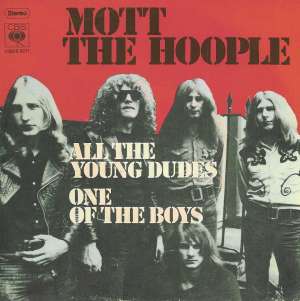
"All the Young Dudes" is a song written by English singer-songwriter David Bowie, originally recorded and released as a single by the English rock band Mott the Hoople in 1972 by Columbia Records. Bowie produced the song, which he had given to the band after they rejected his "Suffragette City". Bowie would subsequently record the song himself. Regarded as an anthem of glam rock, the song has received acclaim and was a commercial success. In 2021, Rolling Stone ranked "All the Young Dudes" number 166 in its list of the 500 Greatest Songs of All Time. It is also one of the Rock and Roll Hall of Fame's 500 Songs that Shaped Rock and Roll.
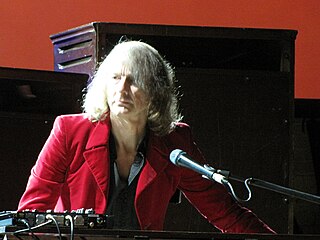
Verden Allen is a British organist and vocalist best known as a founding member of 1970s rock band Mott the Hoople. Before that band formed, he had in the mid-1960s been in a rhythm and blues cover band called The Inmates and recorded with Jimmy Cliff.

Terence Dale "Buffin" Griffin was an English drummer and a founding member of 1970s rock band Mott the Hoople. Later, he worked as a producer, and produced many of the BBC Radio 1 John Peel sessions from 1981 to 1994.

The Hoople is the seventh studio album by British rock band Mott the Hoople. The album peaked in the UK Albums Chart at No. 11, whilst its highest chart rating in the US was No. 28. It was the 85th best selling album of 1974 and was voted 16th best album of 1974 by the readers of Creem magazine. A remastered and expanded version was released by Sony BMG on the Columbia Legacy label in Europe in 2006. It was the only album to feature guitarist Ariel Bender, and the last album to feature vocalist Ian Hunter before his departure for a solo career.

"Roll Away the Stone" is a song written by Ian Hunter, recorded by English rock band Mott the Hoople, and released as a single on the CBS label. On the first version, recorded before Mick Ralphs left the band, Ralphs plays lead guitar and one of the Thunderthighs handles the bridge voice. It was re-recorded by the band for their 1974 album The Hoople, with Ariel Bender on lead guitar and English vocalist Lynsey de Paul singing the vocal bridge.

Shades of Ian Hunter: The Ballad of Ian Hunter and Mott the Hoople is a compilation album by Ian Hunter, consisting of tracks by Hunter's previous band Mott the Hoople, and solo Hunter tracks as well. It was released in 1979 as a double-LP.

Ian Hunter Patterson is an English singer, songwriter and musician. He is best known as the lead vocalist of the rock band Mott the Hoople, from its inception in 1969 to its dissolution in 1974, and at the time of its 2009, 2013, and 2019 reunions. Hunter was a musician and songwriter before joining Mott the Hoople, and continued in this vein after he left the band. He embarked on a solo career despite ill health and disillusionment with commercial success, and often worked in collaboration with Mick Ronson, David Bowie's sideman and arranger from The Rise and Fall of Ziggy Stardust and the Spiders from Mars period.
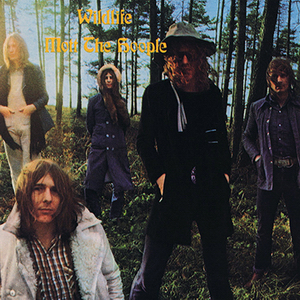
Wildlife is the third album by the British band Mott the Hoople.

Mott the Hoople is the debut studio album by the band of the same name. It was produced by Guy Stevens and released in 1969 by Island Records in the UK, and in 1970 by Atlantic Records in the US. It was re-issued by Angel Air in 2003 (SJPCD157).

Mad Shadows was the second album by Mott the Hoople. It was recorded in 1970 and released in the UK on Island Records in September 1970 and in the US by Atlantic Records. It was subsequently re-released by Angel Air in 2003 (SJPCD158). As with their debut album, it was produced by Guy Stevens.
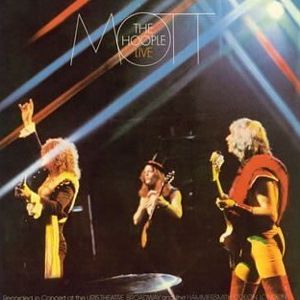
Live is a 1974 album by British band Mott the Hoople recorded during their debut US performance at the Uris Theater (Gershwin) on Broadway in Manhattan, New York City, United States, with Queen as the opening act. A remastered and expanded 30th Anniversary Edition was released by Sony BMG on the Columbia label (516051). The release of the album in its original form in 1974 coincided with the announcement of the band's demise and it was, therefore, their final release. It was a single disc album in its original format but the addition of thirteen extra tracks has seen it expand to a double CD package.

Two Miles From Heaven is a compilation album of tracks recorded by British rock band Mott the Hoople during their period with Island Records from 1969 to 1972. It features the original band line-up of Ian Hunter, Mick Ralphs, Peter Watts, Dale Griffin (drums) and Verden Allen (organ). Incomplete tracks from original sessions were supplemented by overdubs of vocals, keyboards and guitar.
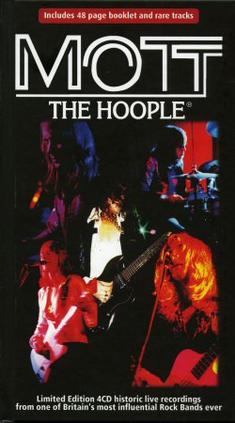
In Performance 1970–1974 is a four CD box-set of live Mott the Hoople concerts between 1970 and 1974. Playing were the original members of the band and also, the new members incorporated in 1973 after Verden Allen's May departure, and Mick Ralph's August departure.

Rock and Roll Queen is a compilation album by the British rock band Mott the Hoople. The album predominantly features selections from the four albums Mott recorded for Island Records in the UK, which were subsequently issued in the US by Atlantic Records. In Canada, the first three were released by Polydor, while Brain Capers was released in Canada by Island.




















